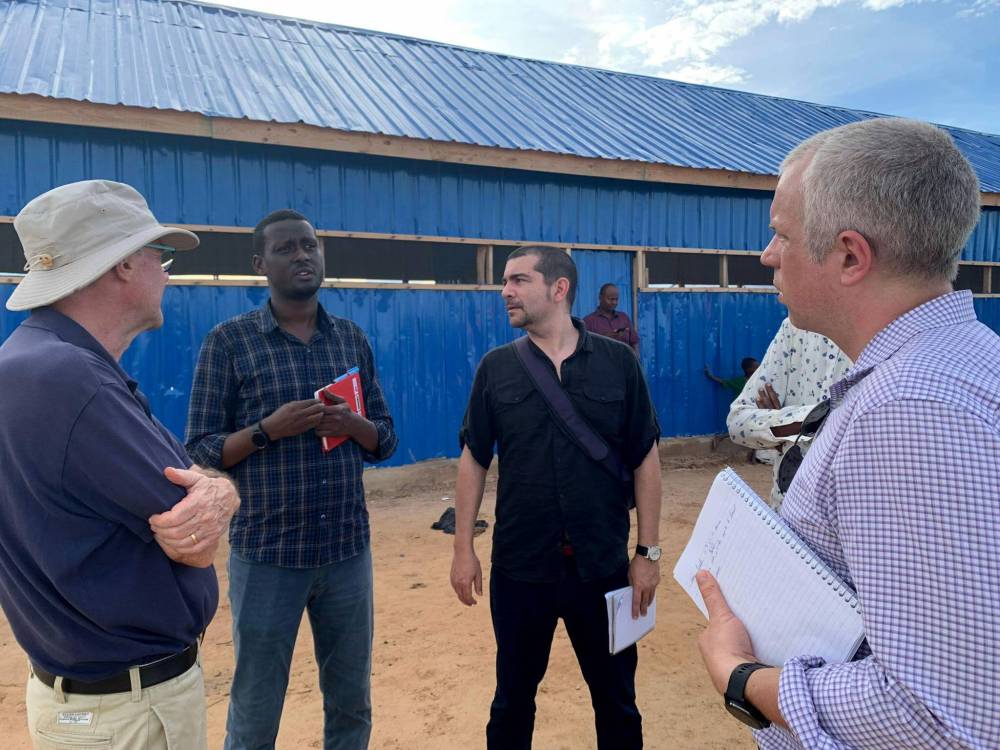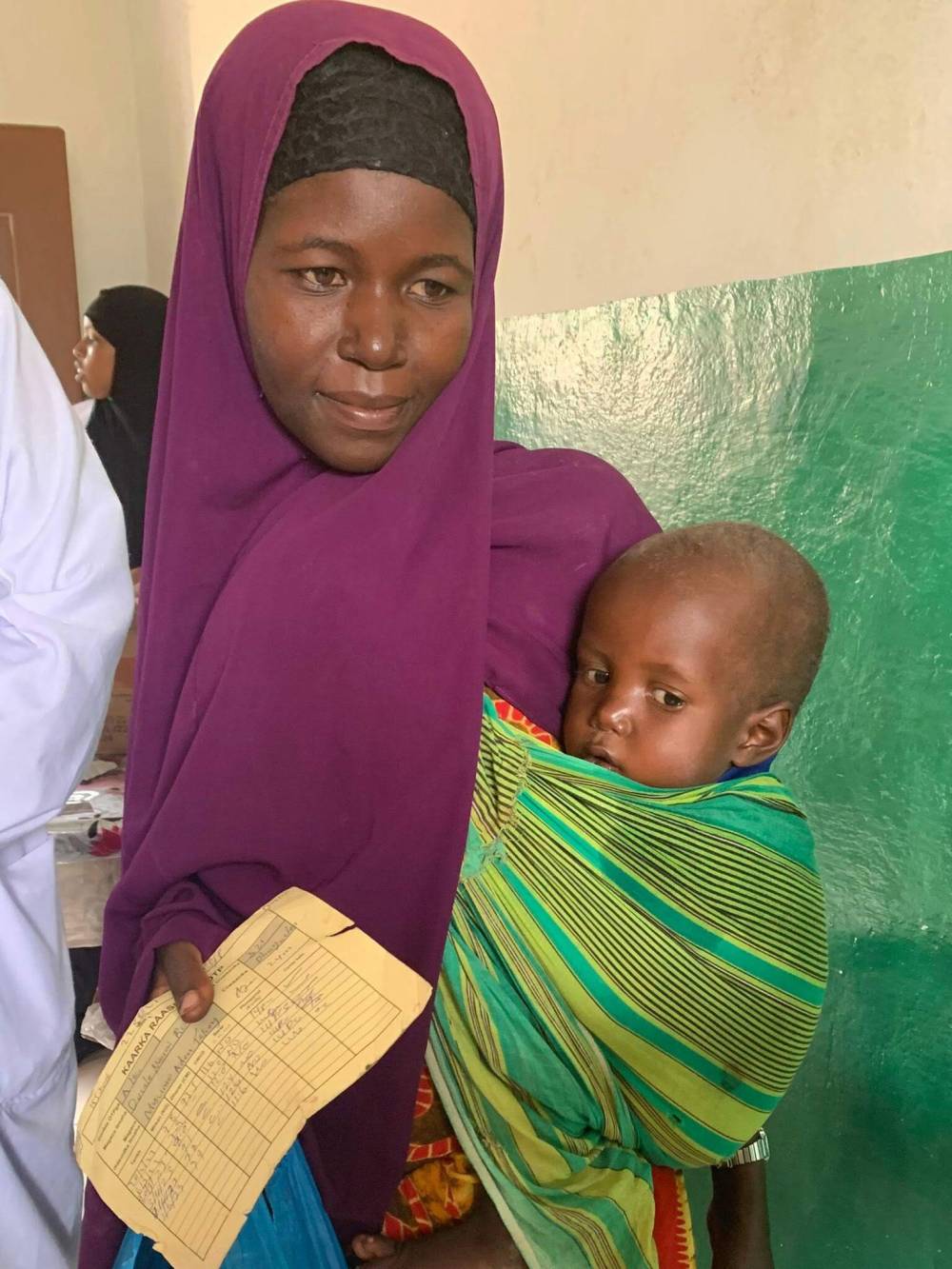
THOUSANDS of malnourished children in Somalia are being kept alive thanks to support from a local aid organization.
Stefan Epp-Koop, humanitarian program director for Canadian Foodgrains Bank, was in the civil war-torn east African nation this week to see how aid provided by that organization is being used to help people suffering from the drought there.
“Conflict, climate change and economic crisis are the three main drivers of hunger, and Somalia is experiencing all three,” he said.
SUPPLIED Stefan Epp-Koop (far right) at the hospital in Luuq where malnourished children are treated.
Hunger in that country is the result of five failed rainy seasons, Epp-Koop said. “It rained a little earlier this year, but it was not enough.”
Added to the misery are food prices, which have risen dramatically. “Incomes are not keeping up with prices,” he said. “The situation is pretty dire.”
To help, the Foodgrains Bank has provided $3.3 million in support to Trócaire, an organization founded by the Irish Roman Catholic Church that a provides health services in the Gedo region in the south-central part of Somalia. Trócaire, which is a partner of Foodgrains Bank member Development & Peace-Caritas Canada, runs four hospitals, five health centres and seven mobile clinics in the region.
The funding from the Foodgrains Bank is being used to help more than 13,500 malnourished children, along with their mothers, caregivers and other vulnerable household members. Altogether, in excess of 70,000 people in the region are receiving assistance.
The funding for the assistance comes from the federal government, which last year provided $250 million to address the global hunger crisis; the Foodgrains Bank received $14 million from that funding package for use in places such as Somalia. Funding also comes from individual donations from Canadians.
For Epp-Koop, a father of two children ages seven and five, visiting a Trócaire hospital where the most severely malnourished children are receiving medical help was “heartbreaking.”
He said it’s “difficult to imagine” what Somali parents are going through as they watch their children wither away from hunger.
The hospital he visited, in the town of Luuq, has seen an increasing number of malnourished children this year, he said.
“So far this year, they have seen over 1,400,” he said, noting two years ago the hospital treated only 224 children.
The rise in cases has swamped the facility; the ward that treats the most severely malnourished has room for 15 beds but now is crammed with 25.
One of those children is Ducale, age two, who was brought to the hospital by his mother, Muslima. He has been at the hospital since February, suffering from severe malnourishment; he has significantly improved since then.
SUPPLIED Muslima with her son, Ducale
Seeing Ducale and the other children brought the urgency of the situation home to Epp-Koop.
“There are so many children here needing treatment,” he said, noting children like Ducale typically spend 12 days in the hospital receiving care. Once healthier, they are sent home with a supply of Plumpy Nut, a peanut-based paste rich in protein that helps children maintain the weight they gained.
While seeing so many children in need of help makes him sad, he also feels hopeful knowing “aid from the Foodgrains Bank is helping,” he said.
When Epp-Koop asked staff at the hospital what they would say to Canadians who donated to help children in Somalia, “they had a clear message of thanks,” he said. “They want them to know their donations are saving lives.”
As for Somalia itself, even if the rains finally come the recovery will be long. “So many have lost their homes, farms, jobs and livelihoods to the drought,” he said.
Somalia is just one of the countries on the front lines of the global hunger crisis, he noted. Other countries in Africa experiencing hunger include Ethiopia, South Sudan, Kenya, Zimbabwe and the Democratic Republic of Congo.
When asked about the current conflict between two warring military factions in Sudan, Epp-Koop said the Foodgrains Bank is monitoring the crisis. “We will keep watch to see what kind of response best fits best for us,” he said, adding that could mean helping Sudanese refugees who have fled to neighbouring countries.
The Free Press is committed to covering faith in Manitoba. If you appreciate that coverage, help us do more! Your contribution of $10, $25 or more will allow us to deepen our reporting about faith in the province. Thanks!
BECOME A FAITH JOURNALISM SUPPORTER
Click here to learn more about the project.

John Longhurst
Faith reporter
John Longhurst has been writing for Winnipeg’s faith pages since 2003. He also writes for Religion News Service in the U.S., and blogs about the media, marketing and communications at Making the News.
Read full biography


